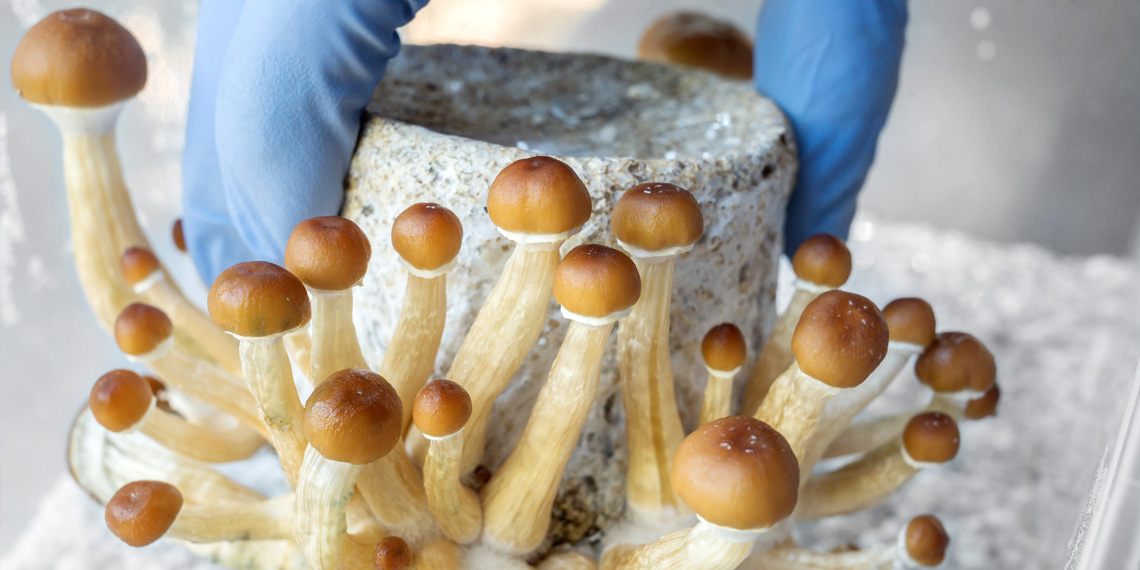A recent study published in AJOB Neuroscience found that a majority of Americans support psilocybin, a psychedelic compound from certain mushrooms, for supervised medical treatment and well-being enhancement. This strong bipartisan approval highlights public openness to legalized and controlled use of the drug for both medical and personal enhancement purposes, though with caution for future policy.
Psilocybin is a naturally occurring psychedelic compound found in certain types of mushrooms, often referred to as “magic mushrooms.” When ingested, psilocybin interacts with serotonin receptors in the brain, creating profound changes in perception, mood, and thought processes. It has long been classified as a Schedule 1 substance in the United States, meaning it has been regarded as having a high potential for abuse and no accepted medical use.
However, recent research has sparked new interest in psilocybin due to its potential benefits, particularly in mental health. Studies have shown that when used under controlled, therapeutic conditions, psilocybin may help reduce symptoms in individuals suffering from conditions such as treatment-resistant depression. Unlike many medications, psilocybin is thought to be non-addictive and may even improve well-being in healthy individuals.
The researchers conducted this study to address a lack of data on public attitudes toward psilocybin in light of recent legalization steps, such as in Oregon, where psilocybin is now allowed in licensed settings for both mental health treatment and well-being enhancement. The study aimed to gauge moral opinions on the supervised use of psilocybin as well as attitudes towards its use beyond clinical needs to enhance general well-being, an area where previous studies were lacking.
To conduct the study, the researchers recruited a nationally representative sample of 805 Americans through an online platform. This sample was then refined to 795 participants after excluding those who did not meet attention criteria. The participants’ ages ranged from 18 to 92, with a median age of 44. The sample was diverse, encompassing various genders, races, and political affiliations, making it reflective of the United States’ demographics.
Each participant received background information about psilocybin, including its origin, effects, and legal status. They were also informed about the new Oregon law permitting supervised psilocybin use and asked to imagine a similar law on a national level.
Participants were then randomly assigned to read one of two scenarios where psilocybin was used under professional supervision in a licensed setting. In one scenario, the drug was used to treat a mental health condition, while in the other, it was used by a healthy individual seeking well-being enhancement.
After reading their assigned scenario, participants were asked to assess the moral acceptability of the individual’s decision to use psilocybin in that controlled environment. Participants also completed several moral and demographic assessments, covering their values, empathy, and political views, among other factors.
The study revealed that 89% of participants viewed supervised psilocybin use for mental health treatment as morally acceptable, and 85% approved of its use for well-being enhancement. Although slightly more participants supported medical use than enhancement, the general trend showed broad acceptance. Interestingly, this approval spanned across political lines, with both liberals and conservatives showing a strong endorsement for supervised psilocybin use in licensed settings.
However, support varied slightly with age and political leanings: younger adults and political liberals expressed higher approval than older adults and conservatives. Furthermore, participants who prioritized values like care and empathy were more inclined to view psilocybin use positively, linking these values with their desire for both patient and individual well-being.
Despite the study’s insightful results, there are some limitations. First, it focused solely on supervised use in licensed settings, omitting public opinions on unsupervised or recreational uses of psilocybin, which may carry more risks. Additionally, the study did not examine whether participants’ knowledge or beliefs about psilocybin might change over time with continued media and scientific attention on psychedelics.
Future research might look into attitudes toward unsupervised use or expand on how people perceive risks associated with psychedelics in different contexts. Understanding these attitudes could guide lawmakers in developing policies that align with public sentiment while addressing the risks associated with non-supervised psychedelic use.
“Caution is also required in relation to the apparent hype bubble now surrounding the so-called ‘psychedelic Renaissance,’” the researchers concluded. “Given the early stage of the field, both over- and understatements of trial results are not uncommon. Current scientific evidence, however, does not allow for rash conclusions beyond the fact that psilocybin has significant medical potential and a good safety profile compared to other drugs, given the right context.”
“It is imperative that claims do not get ahead of the state of the evidence. Nevertheless, our findings do suggest that the safe and supervised use of psychedelics under conditions of legalization has the potential to find wide public acceptance. If the field can overcome scientific inaccuracies, pursue rigorous research, and build trust—then psychedelics such as psilocybin may one day be seen as a mainstream means to treat mental illness and possibly also to promote overall well-being.”
The study, “Strong Bipartisan Support for Controlled Psilocybin Use as Treatment or Enhancement in a Representative Sample of US Americans: Need for Caution in Public Policy Persists,” was authored by Julian D. Sandbrink, Kyle Johnson, Maureen Gill, David B. Yaden, Julian Savulescu, Ivar R. Hannikainen, and Brian D. Earp.




